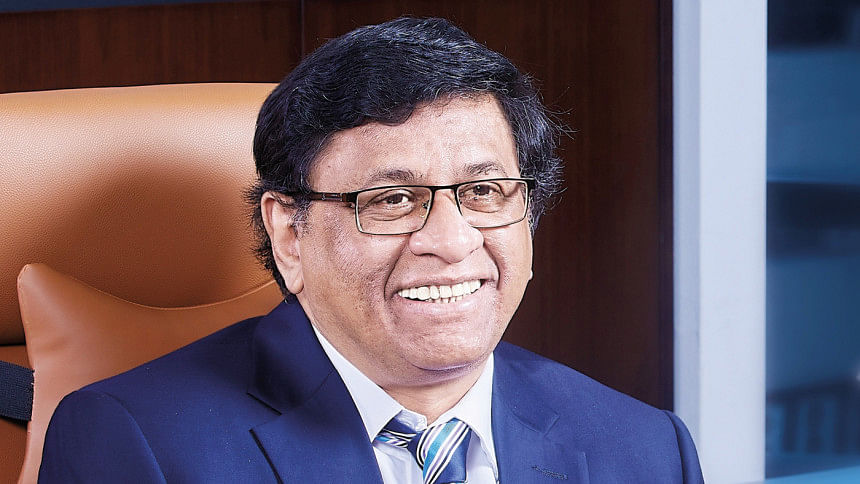Empowering cmses through collateral-free loan access

Sohail R K Hussain
Managing Director, Bank Asia
The Daily Star (TDS): How do you assess the current state of the MSME sector in Bangladesh, and what role do you think banks can play in accelerating its growth?
Sohail R K Hussain (SRKH): The MSME sector is the backbone of Bangladesh's economy, contributing around 32% to GDP and accounting for approximately 85% of total employment. Despite its significance, the sector continues to face key challenges such as limited access to formal finance, informality, outdated business practices, and inadequate infrastructure. Banks can play a pivotal role in accelerating MSME growth by adopting a more inclusive and innovation-driven approach. This includes developing tailor-made financial products, promoting financial literacy and business management training, and leveraging digital platforms for credit scoring and approval processes, thereby reducing turnaround time and increasing access to finance. Enhancing mobile and internet banking services will also promote wider adoption of formal financial services. Supporting the formalisation of businesses through easy digital registration and documentation tools can bring more MSMEs into the formal economy. By establishing business incubation centres and offering mentoring and advisory services, banks can act not only as financial intermediaries but also as growth partners in unlocking the full potential of the MSME sector.
TDS: What are the major challenges MSMEs face in accessing finance, and how is your bank addressing these issues—especially for micro and cottage industries?
SRKH: Access to finance remains a major hurdle for MSMEs in Bangladesh—especially micro and cottage industries—due to inadequate collateral, low financial literacy, informal operations, and lack of proper documentation.
Bank Asia is actively addressing these challenges by offering collateral-free loans, with 12,900 such loans already disbursed to CMSEs. We've simplified loan processing, expanded agent banking, and adopted digital platforms to streamline credit approvals. Special refinancing and credit guarantee schemes are in place to support women entrepreneurs and agro-processing businesses.
In 2024, we organised 92 financial literacy events, directly engaging 3,805 marginalised individuals, including 2,717 women. Our Financial Literacy Campaign 2024, conducted through a nationwide roadshow caravan, reached 66,306 people directly and raised awareness among over half a million individuals—fostering greater financial inclusion for underserved communities.
TDS: Does your bank have any dedicated products, financial literacy programmes, or credit guarantee schemes targeted at MSMEs? Please share key initiatives.
SRKH: Bank Asia PLC is deeply committed to supporting MSMEs through a range of specialised products, financial literacy programmes, and credit guarantee schemes. We offer collateral-free financing to cluster-based industries—such as the cloth cluster in Bogura and the electronics manufacturing cluster in Jurain, Dhaka.
The bank actively participates in Bangladesh Bank's credit guarantee schemes to improve access to finance for small entrepreneurs. In partnership with Bangladesh Bank and SME Foundation, we also conduct financial literacy programmes targeting prospective and existing entrepreneurs. Additionally, we are introducing a special training programme for freelancers, designed to enhance their financial literacy, digital skills, and access to banking services. These initiatives collectively strengthen the MSME ecosystem and promote inclusive economic growth across the country.
TDS: How has your bank leveraged technology or digital banking solutions to improve outreach and services to MSMEs, particularly in semi-urban and rural areas?
SRKH: Bank Asia PLC has utilised technology to expand its reach by growing its agent banking network to over 5,000 outlets in rural and semi-urban areas, implementing e-KYC and digital document submission for CMSME loan applications, and providing digital platforms for an online loan approval system. These innovations have significantly improved MSMEs' access to financial and banking services, particularly benefiting micro and cottage sector businesses in rural areas.
TDS: What steps is your institution taking to support women-led MSMEs and promote financial inclusion among underrepresented segments?
SRKH: Bank Asia supports women-led MSMEs and underrepresented groups by offering tailored financial products, along with refinance facilities and credit guarantee schemes at preferential interest rates. The bank also provides branding materials, distributes smartphones and biometric devices to women micro-merchants, and conducts training and workshops in collaboration with organisations such as Bangladesh Bank, SME Foundation, and WE Association to improve financial access and entrepreneurial skills. Additionally, Bank Asia has established 400 women's centres across its agent outlets. Currently, 11% of agent owners are women entrepreneurs, and over 1,000 women are employed at agent points under the agent payroll. Moreover, 62% of our agent banking customers—4.40 million—are women. We are set to introduce remittance-backed deposit products exclusively for women customers, aimed at encouraging savings and financial empowerment.
TDS: Looking ahead, what policy reforms or collaborative efforts between banks and the government would you recommend to ensure sustainable development of Bangladesh's MSME ecosystem?
SRKH: To ensure the sustainable development of Bangladesh's MSME ecosystem, key policy reforms should include simplified documentation processes, comprehensive credit guarantee schemes for all microloans, insurance coverage support, tax incentives, and easier business registration. Collaboration between banks and the government should focus on expanding digital infrastructure, offering targeted financial literacy programmes, and strengthening refinancing facilities to support underserved MSMEs, particularly in rural areas and among women entrepreneurs.

 For all latest news, follow The Daily Star's Google News channel.
For all latest news, follow The Daily Star's Google News channel. 



Comments